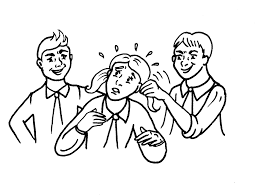Do freshmen deserve the hate?

This is a depiction of what stereotypical high school bullying may look like.
January 27, 2022
Many are influenced by the notion that the freshmen are considered atypical in a high school setting. This difficult take makes it hard for students and teachers alike to decipher a foolish stereotype, from a factual claim. The freshmen class may likely be akin to the upperclassmen, but they’re just not yet familiar with the high school setting, and therefore act in ways that are viewed as unnatural by others. This claim seems to be the most credible. If all freshmen are outlandish in nature but become self-aware later on, then it is safe to assume that it is an issue more so of maturity, and less of pure foolishness. According to the Advocates for Youth website, “Most teens ages 13 to 17 will: Attain cognitive maturity—the ability to make decisions based on knowledge of options and their consequences.”
In spite of the fact that this age group of teens has the ability to gain an amount of maturity, the question still remains as to whether or not they can drop their cognitive dissonance. Clearly, this is far more an issue of perspective than definite certainty. Depending on how you look at it, the argument can be made that yes, freshmen do indeed deserve the scrutiny they undergo until they become upperclassmen as it is a common public school stereotype. Nonetheless, it is important to consider that children exhibit a fair amount of cognitive maturity, but even more so dissonance.
Leniency in this regard is highly warranted and expected. But of course, one’s age does not necessarily guarantee any level of maturity, as each individual varies in their own way. Additionally, age does not necessarily correlate with decision making, despite not having reached the age of maturity, the majority of children do have the ability to tell right from wrong.
Regardless of the opinions of the general public, it is highly probable that this debate will continue to exist and freshmen will likely continue to act uncouth. They may make remarks that are inappropriate or uncalled for, leading to consequences, whether it be from school administration, or other students.
The answer to this question is very mixed. In order to be deserving of hate, you must exhibit some action that shows you are worthy of it. High schoolers’ brains are not fully developed and therefore are not as mature as someone that is 25 by default. So it is truly difficult to blame either the instigator or the victim in these situations. From an entirely technological standpoint, freshmen are not worthy of hate due to their lack of maturity, therefore do not deserve it. However, from a moral standpoint, they may very well be, as actions are bound to hold moral and civil implications.

Aamara • Apr 23, 2022 at 11:32 pm
We, freshmen, do not deserve the hate we get. Of course, some of us are very childish or challenging . At least some of us are nice and very hard working rather than our “older role models” we are supposed to look up to
sean • May 18, 2022 at 6:49 pm
dude, all freshman are weird.
Andrew • May 20, 2022 at 11:55 pm
Last sentence responded to a generalization with a generalization.
There are a few freshmen who I witnessed playing the “penis game”, so the few bad apples can ruin the bunch. Just convince your freshmen brethren to be better and maybe they’ll actually get some maidens? I can’t say for sure…
I was a freshman too, it’s part of life, once you become a sophomore the world just works differently. You’ll understand when you’re older, let the cycle continue.
~Andrew Out
Sophomore • Jun 7, 2022 at 1:33 pm
The infamous freshmen epidemic disperses mid August within Olathe South’s halls each and every year, however, it appears as though every year they decline both intellectually and socially. While the majority of today’s freshman students can not properly identify the difference between “you’re” and “your”, it is only expected that they will carry this ignorance into their adult lives, that is, if they ever choose the route of maturity. Freshmen are dumb and stupid take the L 9th graders!!!
-sophomore
Andrew • Mar 11, 2022 at 11:31 am
Interesting viewpoint, you conceived a couple of arguments of which I disagree with though. While you claim this is a ‘foolish’ stereotype, I might contemplate that freshmen (being unfamiliar with secondary school) are responsible for multiple predicaments. For instance, I once strolled through a corridor and discovered an accumulation of these students congesting the area. To proceed through was unthinkable as these underclassmen constructed a barrier as indestructible as titanium. Alas, freshmen are a fascinating specimen.
Ash • Mar 11, 2022 at 8:32 pm
9th grade rocks wdym